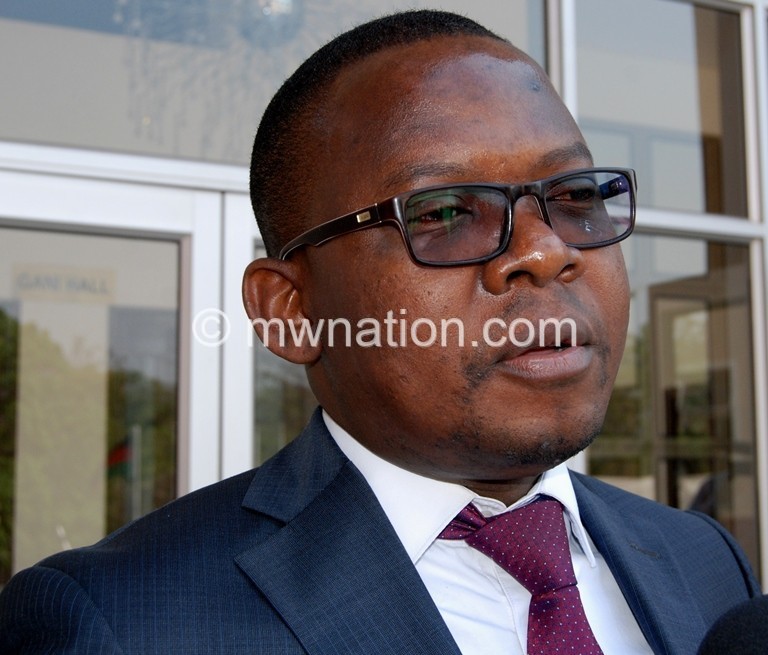MLS, others hail judgement
Malawi Law Society (MLS) has welcomed the Constitutional Court ruling nullifying the May 21 2019 presidential election, describing it as a landmark decision that will guide the management of future elections in the country.
In an interview soon after the judgement, MLS president Burton Mhango said the ruling by the five-judge panel of the High Court of Malawi sitting as the Constitutional Court was well explained, thoroughly considered and serves the rule of law. MLS and Women Lawyers Association (WLA) joined the presidential election nullification petition case as friends of the court.

He said: “It hopefully justifies the patience that MLS and other stakeholders have been calling for from the public since the dispute arose. If it is not dealt otherwise on any possible appeal, it gives sound guidance and excellent lessons for all.”
Mhango said the court has also vindicated the Law Society’s call regarding the need for Parliament to reconsider the issue of 50+1 majority in electing the President in future elections.
“We still consider that is also good pronouncement. But, as already indicated, this is subject to any possible appeal or other determinations that may be made by the Supreme Court,” he said.
On his part, private practice lawyer John-Gift Mwakhwawa said the ruling was a watershed decision the country saw coming since 1999, adding that the decision has indicted MEC.
He said: “MEC has been properly charged. The court has made its decision based on careful, exhaustive evidence and the law. The court has made crucial findings on the evidence before it and made a clear determination.”
Mwakhwawa said the judgement was “a yardstick and a handbook for free and fair elections in Malawi” and welcomed the use of both qualitative and quantitative approach, saying it was not only about the numbers.
On the fate of MEC chairperson Jane Ansah, a judge of the Malawi Supreme Court of Appeal who rejected calls for her to resign for presiding over a flawed electoral process arguing that she can only step down if a competent court faulted her, Mwakhwawa said she has been convicted.
He also said the ruling vindicated his position that UTM Party leader Saulos Chilima, the first petitioner in the case, was to revert to the position of the country’s Vice-President, saying Chilima and President Peter Mutharika were directly elected by people as a pair.
Ngeyi Kanyongolo, an Associate Professor of law at Chancellor College—a constituent college of the University of Malawi, described the ruling as “a massive landmark that will change the landscape of elections management in Malawi”.
South Africa-based Malawian legal scholar Danwood Chirwa described the ruling as “the most momentous decision in the history of Malawi”.
He said the judges were exceptionally courageous and revamped our Constitution as the framers intended.
“They’ve breathed new life into our otherwise decaying democracy, with the possibility that we can now confidently say that the struggle of the early 1990s has only now, more than 25 years later, borne fruit,” said Chirwa, who teaches law at the prestigious University of Cape Town.
He said the judgement was commanding in its commitment to high principles, archaeological in its method, and Solomonic in both substance and result, saying it corrected one of the most glaring errors committed by the Malawi Supreme Court of Appeal in 1999.
Said Chirwa: “The Supreme Court decision that the winner of the presidential election just needed to garner more votes than other candidates. That Supreme Court was composed of the one-party era judges, accustomed to a culture of submissiveness to the Executive.
“It did a lot of damage to the new political system. Now, 20 years later, the damage that court brought has been seen and it has taken this Constitutional Court to correct that egregious mistake.”
He said on the issue of irregularities, the judges analysed the evidence fact by fact and came to solid conclusions that are practically appeal-proof.
Said Chirwa: “The other critical part of the judgement is the finding that MEC conducted the elections incompetently, not just unlawfully and unconstitutionally. This leaves no room for doubt that the existing MEC cannot continue.”
In a separate interview, Human Rights Defender Coalition (HRDC) vice-chairperson Gift Trapence said democracy has won.
He said Malawians’ and HRDC’s calls for Ansah and her commissioners to resign is vindicated. Trapence, whose movement organised a series of demonstrations demanding Ansah’s resignation, said: “HRDC will push for accountability that MEC commissioners must be replaced.”





